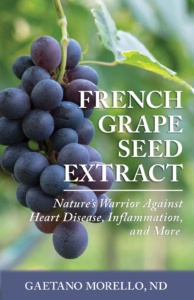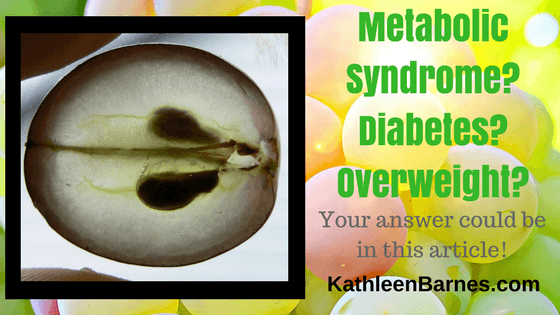 This is an excerpt from an excellent book I recently published: Grape Seed Extract: Nature’s Warrior Against Heart Disease, Cancer, Diabetes, Inflammation and More by Dr. Gaetano Morello.
This is an excerpt from an excellent book I recently published: Grape Seed Extract: Nature’s Warrior Against Heart Disease, Cancer, Diabetes, Inflammation and More by Dr. Gaetano Morello.
Do you ever feel like you’re fighting an epic battle against a host of health conditions?
Modern society tells us that as we age, we are likely to get heart disease, diabetes, cancer and, if we’re lucky to live long enough, we could end our lives with dementia, sick and unaware of our surroundings.
Sometimes it feels like the lifelong fight against illness and disease is a losing battle.
While our culture may dictate that sort of thinking, be assured that the diseases of aging are not inevitable. DNA is not a destiny. What we do, the water we drink, the things we put in our bodies, the nurturing we receive and the environment we live in all dictate what we become.
By controlling our environment and lifestyle, we can prevent the “diseases of aging” from manifesting. The best method of being in charge of our environment is taking charge of what we put into our bodies
Yes, there is definitely a struggle to survive. However, there is a way of winning and it’s simpler then you may think.
Dr. Christiane Northrup, once paraphrased a health goal first put forth by Abraham Hicks, author of The Secret: “Wouldn’t you rather have your life end something like this: Happy, healthy, dead? Isn’t that a lot better than being sick, decrepit and frail for years?”
Isn’t that what all of us really want? We want a quality of life that enables us to live!
In fact, we are fortunate to have been given a wide variety of tools to retain vibrant health well into old age. These are the tools that can help create an internal environment fostering health and longevity.
Grape seed extract is one of those tools, a gift from nature. This is one of the most powerful disease-fighting compounds known to science. Grape seed extract is a warrior of unsurpassed power against disease and for life.
Extensive research has proven that grape seed extract:
- prevents and reverses heart disease
- kills cancer cells and prevents their return
- reduces inflammation
- improves blood sugar metabolism and blood sugar control in people with diabetes
- protects brain cells from the plaque associated with Alzheimer’s disease
- speeds wound healing
- wipes out 10 disease-causing bacteria, including the deadly MRSA
- paves the way for longer life. (Yes, you read that correctly. Stay with me.)
We love wine and all that it contains
Millennia ago, our ancestors loved wine fermented from grapes and it seems that this tradition has withstood the test of time. Perhaps it is part of our genetic structure. Maybe there was–and still is—an intuitive sense of what is really good and life-giving for us. The seeds and skins of grapes yield not only a flavorful beverage, they contain unique substances that pack a powerhouse punch against disease.
The key lies in substances called oligomeric proanthocyanidins (OPCs).
Although OPCs are found in many plants, they are concentrated to an extraordinary level in grape seeds, which explains their healing power.
OPCs are probably the most potent anti-oxidants known to science. What are antioxidants? An apple will turn brown after you cut it due to its exposure to oxygen; we can call this rusting. If you squeeze freshly squeezed lemon juice on it, it won’t brown; the lemon juice acts as an antioxidant. Your lifestyle choices over the course of a lifetime and your exposure to environmental toxins cause “rust” (actually, the correct terminology is free radical oxygen molecules) to accumulate on your cells. That free radical oxygen exposure triggers chronic inflammation, opening the door to cell aging and genetic deterioration, paving the way for the diseases of aging, including heart disease, cancer, diabetes and more. All, at least 90 to 95% of our modern day diseases are caused by oxidative stress and inflammation.
Too bad we just couldn’t squeeze lemon juice into every cell of our bodies, but there is something else we can do
The Great Neutralizer
Lab studies show that OPCs are much more effective than vitamin C and vitamin E and virtually any type of food in neutralizing free radical oxygen molecules. They are super duper lemon juice!
The antioxidant levels in grape seed extract are so high, they are quite literally off the scale. The ORAC (oxygen racial absorbance capacity) value of grape seed extract is so high, it is difficult even for modern equipment to accurately measure it. ORAC values are a measure of the free-radical fighting capabilities of a particular food.
We know that French OPC grape seed extract has an ORAC value of at least 2 million per 100 grams (3 ounces), higher than any other food! Compare this to blueberry, which has a rating of 6,552, dark chocolate powder at 40,200 and strawberries at 3,577. One attempt to measure the ORAC value of high quality grape seed extract failed when a meter went off the charts at an astounding over 15,000,000 per 100 grams.
Foods with high antioxidant power, like grape seed extract, balance immune system responses to reduce long-term (chronic) inflammation as well as short-term (acute) inflammation that govern wound healing and allergic responses.
ORAC Values (per 1 gram)
| French grape seed extract | 20,000 |
| Ginger root | 148 |
| Elderberries | 147 |
| Cinnamon | 131 |
| Acai berries | 102 |
| Artichoke | 94 |
| Blueberries | 47 |
| Blueberries (raw) | 96 |
| Cranberries | 90 |
| Basil (dried) | 61 |
| Blackberries | 59 |
| Red wine (cabernet) | 45 |
| Sage (fresh) | 32 |
—Source US Department of Agriculture 2010
Of course, we are talking about the right grape seed extract. In recent years, there have been some really cheap products on the market that have little or no value. So-called grape seed extract from China can cost as little as $20 per kilo. In this case, you get what you pay for.
The best quality grape seed extract comes from tannin-free French OPC grapes that have a small molecular structure for the best absorbability—and the raw materials cost ten times as much. It’s truly worth it, as you’ll see as you progress through this book.
Disease Fighting OPCs and long-life resveratrol
There’s an extra bang for your buck in grape seed extract.
Resveratrol is another antioxidant, this one using the power of polyphenols, also found in berries and peanuts. It’s known for its unique anti-aging, anti-inflammatory and disease-fighting properties.
Studies show that resveratrol increases the lifespans of some animals (including yeast, worms, fruit flies, fish and mice) who are fed a high-calorie diet, but resveratrol seems to trick their bodies into
“thinking” that they are consuming a life-extending low calorie diet.
We’re sure that this longevity effect works in animals and now new research strongly suggests that this benefit extends to humans as well. That’s great news for foodies and all of us who want to enjoy life and to enjoy a longer life!
All grape seed extract naturally contains resveratrol in addition to the powerhouse antioxidant OPCs. It’s a two for one. That’s a huge bonus!
Substantial research shows that resveratrol has many of the same disease-fighting capabilities as OPCs. It just works in a slightly different way. There is also evidence that the two combined, as they are exclusively in grape seed extract, complement each other synergistically, enhancing their total power.
We’ll go into this in greater detail in Chapter 7, but it’s important right now to underscore the important partnership between OPCs and resveratrol.
A brief history
Despite the fact that humans have enjoyed grapes as food and drink for thousands of years, grape seed extract has only been heavily researched for about 65 years. And that research came about only in a roundabout way.
The tale begins with Jacques Masquelier, a French researcher who began working in the wine-producing Bordeaux region of France in the 1940s and 1950s. It might seem that the most direct route would have taken Masquelier straight to grape seeds, but instead, he took the circuitous route by looking at uses for the red skin waste from peanuts after they were pressed for oil. He began to look for other natural materials that contained OPCs and discovered pine bark extract was a rich source of those healing molecules.
His peanut research led Masquelier to a level of understanding of proanthocyanidins unparalleled in his time. He discovered that OPCs from red peanut skins shortened bleeding time, strengthened blood vessels and offered overall cardiovascular protection.
As a student of history, Masquelier was fascinated with the story of the sailors aboard the ship of French explorer Jacques Cartier. The winter of 1535 was particularly brutal, leaving Cartier and his crew stranded in ice on the St. Lawrence River. Left with little to eat except hard biscuits and dried meat, many of Cartier’s crew died of scurvy before friendly natives showed them how to make tea from the nutrient-rich, reddish-colored bark of the pine tree Tsuga Canadensis.
Masquelier knew that this particular pine bark was rich in OPCs and it didn’t take him long to discover another powerful source of OPCs right in his back yard—grape seeds. From this discovery, he pioneered the process of extracting OPCs from the grape seeds that were abundant in his Bordeaux region.
Today, grape seed extract has been deeply researched for its health benefits. As of this writing, the National Library of Medicine’s database lists 934 published studies on grape seed dating back to 1997, including 39 clinical trials. (Since grape seed extract is a food and cannot be patented, few companies are likely to engage in this expensive investigation, so this number of human trials is uncommon and substantiates its value.)
Grape seed extract is a warrior of formidable strength in fighting the diseases of aging. For those of us who plan to live long, healthy lives, it should be a central part of our nutrient regimen.
My message to those of you who are already suffering from the degenerative inflammatory diseases of aging: Grape seed extract is essential to regaining health.







